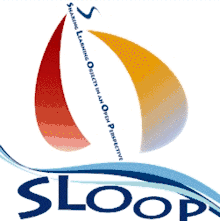SLOOP Project
SLOOP (Sharing Learning Objects in an Open Perspective) is an eLearning and open content project started in 2005 from a European project co-funded within the Leonardo da Vinci programme. SLOOP is a community of practice of teachers who share Open Learning Object (OER). The original idea was to apply the free software philosophy to the production of pedagogical materials for e-learning.

Another two European Projects have followed: Tenegen & Sloop2desc.
History
A Learning Object (LO) is, by definition, a reusable chunk of learning content: the reusability is the main motivation in favour of LOs. But if an LO is covered by copyright, it can be reused from the technical point of view, but legally it is only reusable by the owner. The SLOOP Project introduced the idea of free or open Learning Object: an LO with a licence that allows the material to be used freely, to be changed and to be distributed.
The SLOOP community includes teachers from many countries who share LOs. The SLOOP Project developed free LOMS, a free LO management system.
The SLOOP Project was funded with support from the European Commission under the European Commission "Leonardo da Vinci programme" – with partners in Italy, Ireland, Romania, Slovenia and Spain.[1]
Successors
TENEGEN Project
PROMPT, a Hungarian organisation, presented in the framework of the Lifelong Learning Programme a transfer of innovation project based on the Netis project and SLOOP project results. It was approved and developed between October 2008 and September 2010. The project is called TENEGEN, named for Connect the TEachers – to reach and teach the NET GENeration.
Sloop2desc Project
Another SLOOP project partner, ITD-CNR, presented within the Lifelong Learning Programme a new transfer of innovation project, started in October 2009. Sloop2desc means Sharing Learning Objects in an Open Perspective TO develop european skills and competences. Sloop2desc focused on new educational models based on competences and learning outcomes. Specifically, the project referred to the EQF (European Qualification Framework), that was adopted by the EU Parliament and Council in April 2008, establishing general criteria for comparing qualification systems developed and/or adopted in the EU countries.
Further reading
- (EN) Sharing Learning Objects in an Open Perspective (ISBN 978-88-903115-0-5) (2007)[2]
- (IT) Condividere Free/Open Learning Object (ISBN 88-903115-1-7)(2007) [2]
- (RO) Proiectul SLOOP (2007) [2]
- (EN) "SLOOP: a European Project focused on the realization of a shared repository of free Learning Objects" by Mara Masseroni e,[3] EXPO eLearning Ferrara (6–8 October 2005) [2]
- (IT) "SLOOP: un progetto europeo per un archivio condiviso di Free Learning Object" di Mara Masseroni e,[4] EXPO eLearning Ferrara (6-8 ottobre 2005) [5][2]
- (IT) "SLOOP: sviluppare un Free Learning Objects Management System" ("SLOOP: to develop a Free Learning Object Management System") by,[3] SieL Seminar in Florence (9–11 November 2005) [2]
- (IT) "Dalle scuole in rete a una rete di scuole per la realizzazione di free Learning Object" di,[3] Didamatica, Cagliari (11 - 13 maggio 2006) [2]
- (EN) "A collaborative 'open Learning Objects' management system" by Manuel Gentile, Davide Taibi, Mario Allegra, Giovanni Fulantelli - WSEAS - ENGINEERING EDUCATION 2006 (EE'06)- Vouliagmeni Beach, Athens, Greece, (July 11–13, 2006) - Special Session: Methods and Tools for Managing Learning Objects [2]
- (EN) "Teachers make their expertise available online" - Evening Echo - Thursday September 28, 2006 [2]
- (EN) "Learn to teach on the Net" - Evening Echo - Thursday December 7, 2006 [2]
- (IT) Il cubo della formazione in rete (Brixen 2007) di,[6][7]
- (RO) Ideea SLOOP: schimbul de instrumente pedagogice libere/deschise by [6] e Giovanni Fulantelli [8]
- (HU) A Sloop Otlet: Tananyagelemek nyilt megosztasa by [6] e Giovanni Fulantelli [9]
- (TR) SLOOP FİKRİ : ÖZGÜR-AÇIK ÖĞRETİM by [6] e Giovanni Fulantelli [10]
- (IT) L'uso di Moodle per il progetto SLOOP (Atti del MoodleMoot 2007) by [6] e Monica Terenghi [11]
- (IT) Competenze informatiche degli studenti e competenze e-learning dei docenti: il progetto SLOOP2desc (Atti di Didamatica 2010) by [6] e Roberto Bellini [12]
- (IT) Connettere gli insegnanti per farli incontrare con la Net generation (Atti del VII Congresso SIe-L) di [6] e Giovanni Fulantelli [13]
- (IT) Informatica nella Scuola. Un progetto europeo per formare i docenti (Mondo Digitale n° 4 Dicembre 2010) di [6] e Giovanni Fulantelli [14]
- (IT) Competenze informatiche degli studenti e competenze e-learning dei docenti: il progetto SLOOP2desc (Didamatica 2010, Roma) di [15] e Roberto Bellini,[12]
References
- "The European Programme for Vocational Education and Training". Archived from the original on 9 February 2007.
- Netsons. "Page not found". Netsons.
- "Pierfranco Ravotto". 11 May 2006. Archived from the original on 2006-05-11.
- "PierfrancoRavotto - Blog di Pierfranco Ravotto - Il Cannocchiale blog". www.pierfrancoravotto.ilcannocchiale.it.
- "Wbt.it". www.wbt.it.
- "English version - Pierfranco Ravotto". sites.google.com.
- "2007 - Il cubo della formazione in rete (Convegno a Bressanone)". Scribd.
- "Ideea SLOOP: schimbul de instrumente pedagogice libere/deschise". Scribd.
- "A Sloop Otlet: Tananyagelemek nyilt megosztasa". Scribd.
- "SLOOP FİKRİ : ÖZGÜR-AÇIK ÖĞRETİM". Scribd.
- "2007 - L'uso di Moodle per il progetto SLOOP (Moodlemoot)". Scribd.
- "2010 - Competenze informatiche degli studenti e competenze e-learning dei docenti: il progetto SLOOP2desc (Didamatica)". Scribd.
- "2010 - Connettere gli insegnanti per farli incontrare con la Net generation (Congresso SIe-L)". Scribd.
- "2010 - Informatica nella Scuola. Un progetto europeo per formare i docenti (Mondo digitale)". Scribd.
- "Pierfranco Ravotto". sites.google.com.